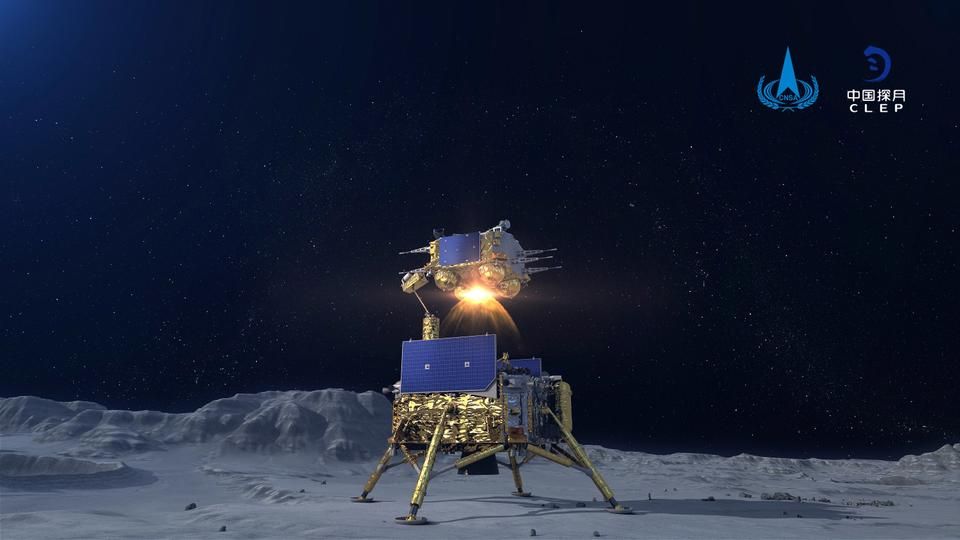China’s Chang’e 5 Successfully Lands in Mongolia with Moon Rocks
Article from Agence France-Presse December 17, 2020 (firstpost.com)
• The unmanned Chinese spacecraft, Chang’e-5, returned and parachuted safely to Earth on December 16th completing the first mission in four decades by any country to collect lunar samples. Scientists hope the samples will give insights into the Moon’s origins and volcanic activity. But the trip was also another high-profile chapter in China’s bid to become a space superpower. In images broadcast on state television, a Chinese flag was flown at the snow-covered grasslands of remote northern Mongolia where the capsule landed.
• The probe’s return “demonstrates the complete accomplishment of China’s first mission to collect samples from an extraterrestrial body,” China’s National Space Administration (CNSA) said. China is only the third country to have retrieved samples from the Moon, following the United States and the Soviet Union in the 1960s and 1970s. While there on the Moon, it planted the Chinese flag.
• When the Chang’e 5 probe left the Moon, it marked the first time that China had achieved take-off from an extraterrestrial body (pictured above). It then linked up with the orbiting part of the spacecraft that brought the samples back to Earth. The Chang’e-5 collected 4.5 pounds of material in a vast, previously unexplored lava plain known as Oceanus Procellarum. The capsule will be airlifted to Beijing for opening, and the Moon samples will be delivered to a research team for analysis and study.
• China has spent billions of dollars on its military-run space program in an effort to catch up with the United States and Russia. China launched its first satellite in 1970. The country’s first human spaceflight was achieved in 2003. The Chinese landed a lunar rover on the far side of the Moon in January 2019.
• Thomas Zurbuchen, a top official at NASA’s science mission directorate, tweeted “The international science community celebrates your successful Chang’e 5 mission. These samples will help reveal secrets of our Earth-Moon system (and) gain new insights about the history of our solar system.” China will make some of the samples available to scientists in other countries.
• China’s future space goals include creating a powerful rocket capable of delivering payloads heavier than those NASA and private rocket firm SpaceX can handle, a lunar base, a permanently crewed space station, and a Mars rover.

An unmanned Chinese spacecraft carrying rocks and soil from the Moon returned safely to Earth early

Thursday, completing the first mission in four decades to collect lunar samples. While scientists hope the samples will give insights into the Moon’s origins and volcanic activity on its surface, the trip was also another high-profile chapter in China’s bid to become a space superpower. In images broadcast on state television, a Chinese flag was flown at the snow-covered grasslands where the capsule landed in the country’s remote north.
The probe’s return “demonstrates the complete accomplishment of China’s first mission to collect samples from an extraterrestrial body,” China’s National Space Administration (CNSA) said.
China is now only the third country to have retrieved samples from the Moon, following the United States and the Soviet Union in the 1960s and 1970s.

Chang’e-5, named after a mythical Chinese Moon goddess, landed on the Moon on 1 December.
While there, it raised the Chinese flag, the country’s space agency said.
When the probe left the Moon two days later, that marked the first time that China had achieved take-off from an extraterrestrial body, it said.
The module then went through the delicate operation of linking up in lunar orbit with the part of the spacecraft that brought the samples back to Earth.
The Chang’e-5 mission was to collect two kilograms (4.5 pounds) of material in an area known as Oceanus Procellarum — or “Ocean of Storms” — a vast, previously unexplored lava plain, according to the science journal Nature.
The capsule will be airlifted to Beijing for opening, and the Moon samples will be delivered to a research team for analysis and study, China’s space agency said.
FAIR USE NOTICE: This page contains copyrighted material the use of which has not been specifically authorized by the copyright owner. ExoNews.org distributes this material for the purpose of news reporting, educational research, comment and criticism, constituting Fair Use under 17 U.S.C § 107. Please contact the Editor at ExoNews with any copyright issue.
